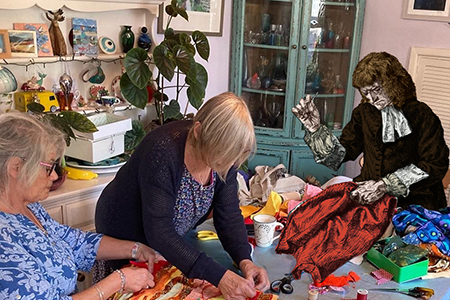Religious questioning
George Fox was born in 1624 in Fenny Drayton, Leicestershire, England. Raised by devout parents, Christianity was very important to him. But in his youth he grew frustrated with how some Christians lived. In their daily lives they would fail to act on the beliefs they recited in church. Fox wanted to be part of a faith community that lived out what they believed with integrity.
After years of travelling, searching for a trustworthy religious teacher, he fell into despair. So he spent time reading the Bible and sitting in quiet reflection. This led him to the revelation that everyone could hear God's voice directly – that there was that of God in everyone.
The Church of England's priests and bishops relayed Jesus' teachings to their congregations, but Fox felt that this hierarchy was unnecessary. He believed that anyone could be guided by the spirit of Christ within them. People didn't need religious leaders to create the kingdom of heaven on earth – they could achieve that for themselves.
Spreading the message
George Fox lived at a time of huge political and religious upheaval. Challenging the established church could be dangerous, and Fox was jailed many times for spreading his egalitarian message. But his message appealed to many. It was a message of freedom – freedom from the authority of priests and from the fear of sin and damnation.
In 1652 he had a revelation at the top of Pendle Hill in Lancashire. This prompted him to search out communities of seekers who had already left the established church. They worshipped together without ritual or leader, waiting for God's message to be revealed to them. Fox brought many of the answers they had been looking for. Many were inspired to leave home to spread his message and their silent worship throughout England and beyond. These people became the very first Quakers.
Early Quakers
Elizabeth Hooton was a prominent early Quaker. She met George Fox in 1647, and some of the first Quaker meetings for worship took place in her home. She became a strong advocate for Quakerism in England and America, and acted against the power of the clergy. She also petitioned for better prison conditions.
James Nayler was another early Quaker. When he met Fox in 1652, he had recently left the army and was looking for a different way of life. He found his spiritual home in Quakerism and led many people to explore the faith for themselves.
George Fox met Margaret Fell in 1652 when visiting Swarthmoor Hall in Cumbria. She was a brilliant writer and organiser and was key to the early organisation of the Society of Friends. Fox stayed for long periods at Swarthmoor Hall. It became a place where early Quakers could meet, organise and plan preaching missions.
When preaching in England and across the Atlantic, these early Quakers didn't know how their message would be received. Many were beaten and imprisoned for living out their convictions on truth and equality. They insisted on addressing everyone as equals and telling the truth at all times, rendering oaths unnecessary. These were radical actions, and many people resented the way Quakers were shaking up established social and religious systems.
Watch our video on George Fox, Margaret Fell and Swarthmoor Hall
Fox's legacy
George Fox travelled widely in England. He visited Scotland, Ireland and Wales, and spent time in the Caribbean and on the east coast of America. Wherever he went, he strengthened Quaker communities or seeded new ones. He was a great preacher and wrote hundreds of pamphlets. His journal describes his religious experiences and travels spreading the good news that “Christ has come to teach his people himself".
The clarity of his message, his passion for sharing it and his ability to survive several stints in prison made Fox the best known of the early Quakers. His system of weekly, monthly and yearly gatherings to coordinate the new church is still used worldwide. And his writings are frequently quoted in Quaker meetings. Four hundred years on from his birth, Fox's message that there is that of God in everyone still guides the actions and beliefs of Quakers around the world.
